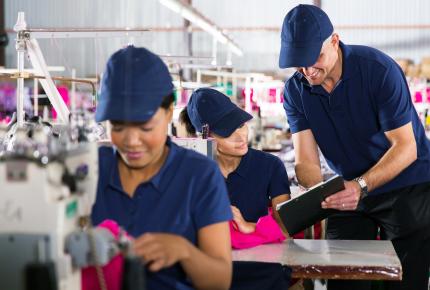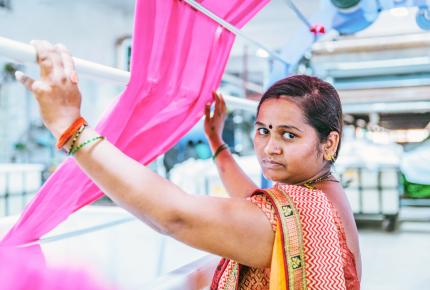
How a global pandemic affected the lives of supply chain workers
One year into the COVID-19 pandemic, more businesses are realizing the importance of verifying workplace risks in their upstream supply chains. Companies need to know who is producing their products – and under what conditions.
Supply chain workers can be vulnerable, especially during a global health crisis. Assessing the supply chain from end to end enables businesses to pinpoint potential human rights issues, from poor working conditions and modern slavery to child labor. In the context of a global pandemic, it also helps address a specific issue: non-respect of sanitary protocols.
Understanding the supply chain is particularly important today, as increased demand for certain products over the past year has put pressure on supply chains, exacerbating social responsibility risks.
This concern can be illustrated by looking at gender inequalities over the past year. Women represent 70% of health and social care globally, putting them at the forefront of COVID-19 care. The workforces of hard-hit industries such as the garment and foodservice sectors are also widely made up of female workers. With women in high-risk situations, the strain on supply chains during this time is expected to increase the gender poverty gap.[1]
An especially relevant risk arising from constrained supply chains is the ability to deliver the COVID-19 vaccine to low-income countries. Without sufficient deliveries in more rural areas, supply chain workers’ health is continually under threat.
Business continuity at the expense of the workforce
The COVID-19 pandemic is not just a global health crisis, but also one of labor and economics. As businesses struggled to maintain continuity in 2020, employment terminations and reductions in working hours led to a loss of 114 million jobs worldwide[2].
The garment industry in particular faced major demand shocks at the beginning of the pandemic. Being an industry with an already high risk of labor exploitation, they suffered further stress when orders were cancelled and payments withheld. Ultimately, these demand halts led to workers going without income, leaving them and their families even more vulnerable to exploitative employment practices, including slavery[3].
A study has shown that 61% of consumers are now making more environmentally friendly, sustainable, or ethical purchases, with 89% likely to continue post-crisis.
Supply and demand setbacks
While many industries suffered a sharp fall in orders, others experienced a surge. Supply and demand issues for personal protective equipment (PPE) started with hospital personnel and expanded across the general population. Demand for face masks skyrocketed from a yearly average of 25,000 units to a record 55 million in the immediate response to COVID-19[4].
This unprecedented demand disrupted global supply chains, with many suppliers unable to meet requests. In many cases, buyers prioritized availability over due diligence and quality checks.
The manufacturing of healthcare equipment is an industry that has a history of labor rights violations. Due to the travel restrictions imposed worldwide at the beginning of the crisis, physical audits of suppliers became extremely challenging for many companies. This put a strain on the systems that typically prevent and tackle modern slavery in supply chains. One year into the crisis, closer scrutiny is now once again possible.
A sustainable shift in consumer habits
All this comes at a time when consumers are paying far greater attention to how companies behave, and whether their social responsibility claims match the reality. A study has shown that 61% of consumers are now making more environmentally friendly, sustainable, or ethical purchases, with 89% likely to continue post-crisis[5].
As habits change and the consumer moves towards more sustainable shopping, retailers and brands need to be prepared to cater to these changes. With a more ethically-conscious consumer in mind, an in-depth understanding of the supply chain is crucial.
How social audits help you understand supply chain risk
Today, it is vital for businesses to be aware of what is happening at each stage of their supply chain, and the risks involved. By carrying out a social audit, you can ensure responsible business practice.
Social audits involve an auditor visiting the site of a business in order to assess conditions. They enable companies to assess their suppliers and monitor health and safety, as well as signal human rights abuses. You may decide to request an audit of a supplier’s site, or one of your customers may request for a social audit to be carried out at your site.
Many companies choose to follow SMETA[6], an ethical audit methodology which encompasses all aspects of responsible business practice. Bureau Veritas is one of the companies accredited by SEDEX, the methodology owner, to deliver 2-pillar or 4-pillar SMETA audits.
The 2-Pillar audit covers labor standards and health and safety standards, which are mandatory modules for any SMETA audit. Additional elements include Universal Rights, Responsible Recruitment Practices, Entitlement to Work, Subcontracting and Homeworking, and a condensed Environment Assessment. The 4-Pillar audit combines these elements with the extended Environment Assessment and Business Ethics audit.
Bureau Veritas is able to deliver these highly recognized audits in most countries, enabling you gain a thorough understanding of all your upstream operations. When it is not possible to conduct onsite audits, we are also authorized to conduct SEDEX Virtual Assessments. In such circumstances, and with the help of modern technology, we can collect feedback directly from workers as part of the audit.
The result is peace of mind for you – and transparency for your customers.
To find out more about Bureau Veritas’ social audits, contact your local Bureau Veritas representative
Watch On-demand webinar to understand Sedex Virtual Assessment
FURTHER READING
|
WEBINAR: Using social compliance audits to ensure ethical sourcing across your supply chain |
References:
[1] Sedex: 10 priorities for sourcing more responsibly during COVID-19 recovery
[2] International Labour Organization: ILO Monitor: COVID-19 and the world of work. Seventh edition
[3] Journal of Risk Research: Survival at the expense of the weakest? Managing modern slavery risks in supply chains during COVID-19
[4] Figures from UNICEF report May 2020: COVID-19 impact assessment and outlook on personal protective equipment
[5] Consumer Research report: COVID-19: New habits are here to stay for retail consumers
[6] SMETA: Sedex Members Ethical Trade Audit

